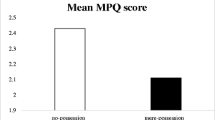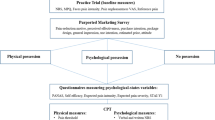Abstract
Placebo effects are important in pain reduction, but the effects are inconsistent. Prior experience with a pain stimulus may moderate placebo analgesia. The current study tests the effect of prior experience with a pain stimulus on placebo analgesia during a laboratory pain task. Healthy normotensive undergraduates (66 women, 68 men) who either did or did not report prior experience with pain from submerging a limb in cold water were enrolled. In the laboratory, an experimenter applied an inert, medicinal-smelling cream to participants’ non-dominant hand. Participants randomized to the no-expectation group were told that the cream was a hand cleanser. Participants randomized to the placebo expectation group were told that the cream would reduce the pain associated with the cold pressor task. Participants then completed the cold pressor task and reported their pain on the short form of the McGill Pain Questionnaire. Analysis of variance revealed a main effect of expectation (p < .05), such that participants in the placebo expectation group reported less pain. An interaction was also found between expectation and prior experience (p < .05), such that participants with prior experience with pain from cold water immersion showed no difference in pain reports between expectation groups. In a pain context, prior experience with the pain stimulus may prevent a placebo expectation from reducing the experience of pain.
Similar content being viewed by others
References
Axsom, D., & Cooper, J. (1985). Cognitive dissonance and psychotherapy: The role of effort justification in induced weight loss. Journal of Experimental Social Psychology, 21, 149–160.
Benedetti, F. (2009). Placebo effects: Understanding the mechanisms in health and disease. USA: Oxford University Press.
Biernat, M. (2005). Standards and expectancies: Contrast and assimilation in judgments of self and others. New York, NY: Psychology Press.
Brown, C. A., Seymour, B., El-Deredy, W., & Jones, A. K. (2008). Confidence in beliefs about pain predicts expectancy effects on pain perception and anticipatory processing in right anterior insula. Pain, 139, 324–332.
Colagiuri, B., & Smith, C. A. (2012). A systematic review of the effect of expectancy on treatment responses to acupuncture. Evidence-Based Complementary and Alternative Medicine, 2012, 857804. doi:10.1155/2012/857804
Colloca, L., & Benedetti, F. (2006). How prior experience shapes placebo analgesia. Pain, 124, 126–133.
Doering, B. K., & Rief, W. (2012). Utilizing placebo mechanisms for dose reduction in pharmacotherapy. Trends in Pharmacological Sciences, 33, 165.
Geers, A. L., & Lassiter, G. D. (2005). Affective assimilation and contrast: Effects of expectations and prior stimulus exposure. Basic and Applied Social Psychology, 27, 143–154.
Geers, A. L., Wellman, J. A., Fowler, S. L., Helfer, S. G., & France, C. R. (2010). Dispositional optimism predicts placebo analgesia. The Journal of Pain, 11, 1165–1171.
Geers, A. L., Wellman, J. A., Helfer, S. G., Fowler, S. L., & France, C. R. (2008). Dispositional optimism and thoughts of well-being determine sensitivity to an experimental pain task. Annals of Behavioral Medicine, 36, 304–314.
Higgins, E. T. (1996). Knowledge activation: Accessibility, applicability, and salience. In E. T. Higgins & A. W. Kruglanski (Eds.), Social psychology: Handbook of basic principles (pp. 133–168). New York: Guilford Press.
Hyland, M. E. (2011). Motivation and placebos: Do different mechanisms occur in different contexts? Philosophical Transactions of the Royal Society B: Biological Sciences, 366, 1828–1837.
Hyland, M. E., & Whalley, B. (2008). Motivational concordance: An important mechanism in self-help therapeutic rituals involving inert (placebo) substances. Journal of Psychosomatic Research, 65, 405–413.
Johnson, J. E. (1973). Effects of accurate expectations about sensations on the sensory and distress components of pain. Journal of Personality and Social Psychology, 27, 261.
Johnson, J. E., & Leventhal, H. (1974). Effects of accurate expectations and behavioral instructions on reactions during a noxious medical examination. Journal of Personality and Social Psychology, 29, 710.
Kaptchuk, T. J., Kelley, J. M., Conboy, L. A., Davis, R. B., Kerr, C. E., Jacobson, E. E., & Lembo, A. J. (2008). Components of placebo effect: Randomised controlled trial in patients with irritable bowel syndrome. Bmj, 336, 999–1003.
Lord, C. G., Ross, L., & Lepper, M. R. (1979). Biased assimilation and attitude polarization: The effects of prior theories on subsequent consideration of evidence. Journal of Personality and Social Psychology, 37, 2098–2109.
Melzack, R. (1987). The short-form McGill pain questionnaire. Pain, 30, 191–197.
Montgomery, G., & Kirsch, I. (1996). Mechanisms of placebo pain reduction: an empirical investigation. Psychological Science, 7, 174–176.
Morton, D. L., Watson, A., El-Deredy, W., & Jones, A. K. (2009). Reproducibility of placebo analgesia: Effect of dispositional optimism. Pain, 146, 194–198.
Petrovic, P., Dietrich, T., Fransson, P., Andersson, J., Carlsson, K., & Ingvar, M. (2005). Placebo in emotional processing—induced expectations of anxiety relief activate a generalized modulatory network. Neuron, 46, 957–969.
Petty, R. E., & Cacioppo, J. T. (1986). The elaboration likelihood model of persuasion. In L. Berkowitz (Ed.), Advances in Experimental Social Psychology (Vol. 19, pp. 124–205). New York: Academic Press.
Price, D. D., Craggs, J., Nicholas Verne, G., Perlstein, W. M., & Robinson, M. E. (2007). Placebo analgesia is accompanied by large reductions in pain-related brain activity in irritable bowel syndrome patients. Pain, 127, 63–72.
Price, D. D., Finniss, D. G., & Benedetti, F. (2008). A comprehensive review of the placebo effect: Recent advances and current thought. Annual Review of Psychology, 59, 565–590.
Ross, L., Lepper, M. R., & Hubbard, M. (1975). Perseverance in self-perception and social perception: Biased attributional processes in the debriefing paradigm. Journal of Personality and Social Psychology, 32, 880–892.
Stewart-Williams, S., & Podd, J. (2004). The placebo effect: Dissolving the expectancy versus conditioning debate. Psychological Bulletin, 130, 324–340.
Tetlock, P. E. (1983). Accountability and the perseverance of first impressions. Social Psychology Quarterly, 46, 285–296.
Tracey, I. (2010). Getting the pain you expect: Mechanisms of placebo, nocebo and reappraisal effects in humans. Nature Medicine, 16, 1277–1283.
Turner, J. A., Deyo, R. A., Loeser, J. D., Von Korff, M., & Fordyce, W. E. (1994). The importance of placebo effects in pain treatment and research. Journal of the American Medical Association, 271, 1609–1614.
Vase, L., Riley, J. L, I. I. I., & Price, D. D. (2002). A comparison of placebo effects in clinical analgesic trials versus studies of placebo analgesia. Pain, 99, 443–452.
Wager, T. D., Atlas, L. Y., Leotti, L. A., & Rilling, J. K. (2011). Predicting individual differences in placebo analgesia: Contributions of brain activity during anticipation and pain experience. The Journal of Neuroscience, 31, 439–452.
Wager, T. D., Rilling, J. K., Smith, E. E., Sokolik, A., Casey, K. L., Davidson, R. J., et al. (2004). Placebo-induced changes in FMRI in the anticipation and experience of pain. Science, 303, 1162–1167.
Wilson, T. D., Lisle, D. J., Kraft, D., & Wetzel, C. G. (1989). Preferences as expectation-driven inferences: Effects of affective expectations on affective experience. Journal of Personality and Social Psychology, 56, 519.
Acknowledgments
This research was supported by National Institutes of Health Grant R03 NS051687.
Conflict of interest
Andrew L. Geers, Stephanie L. Fowler, Justin A. Wellman, Suzanne G. Helfer, Shane Close, and Christopher R. France declare that they have no conflict of interests.
Animal and Human Rights and Informed consent
All procedures followed were in accordance with the ethical standards of the responsible committee on human experimentation (institutional and national) and with the Helsinki Declaration of 1975, as revised in 2000.
Author information
Authors and Affiliations
Corresponding author
Rights and permissions
About this article
Cite this article
Geers, A.L., Fowler, S.L., Wellman, J.A. et al. Prior experience with a pain stimulus as a predictor of placebo analgesia. J Behav Med 38, 136–142 (2015). https://doi.org/10.1007/s10865-014-9586-1
Received:
Accepted:
Published:
Issue Date:
DOI: https://doi.org/10.1007/s10865-014-9586-1




